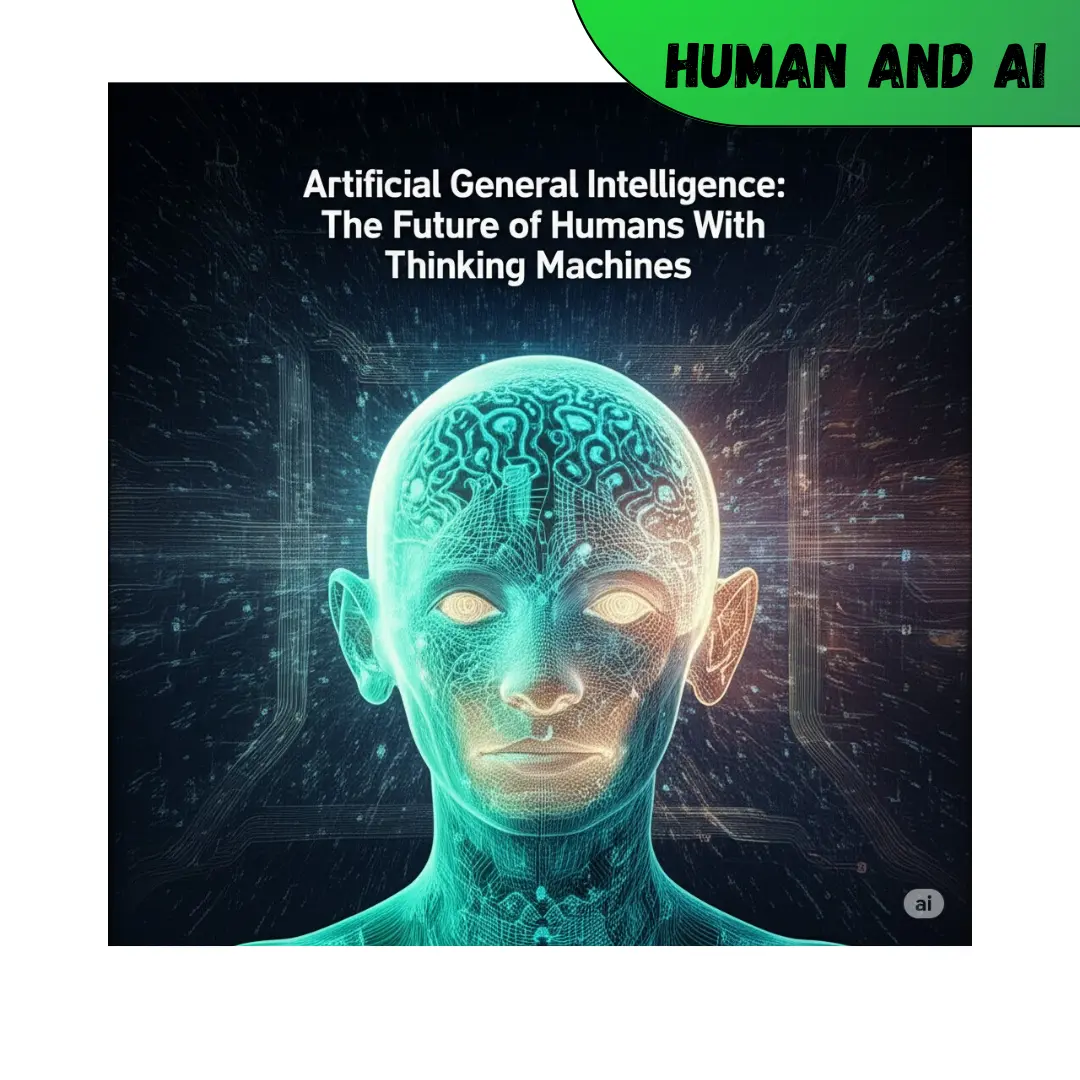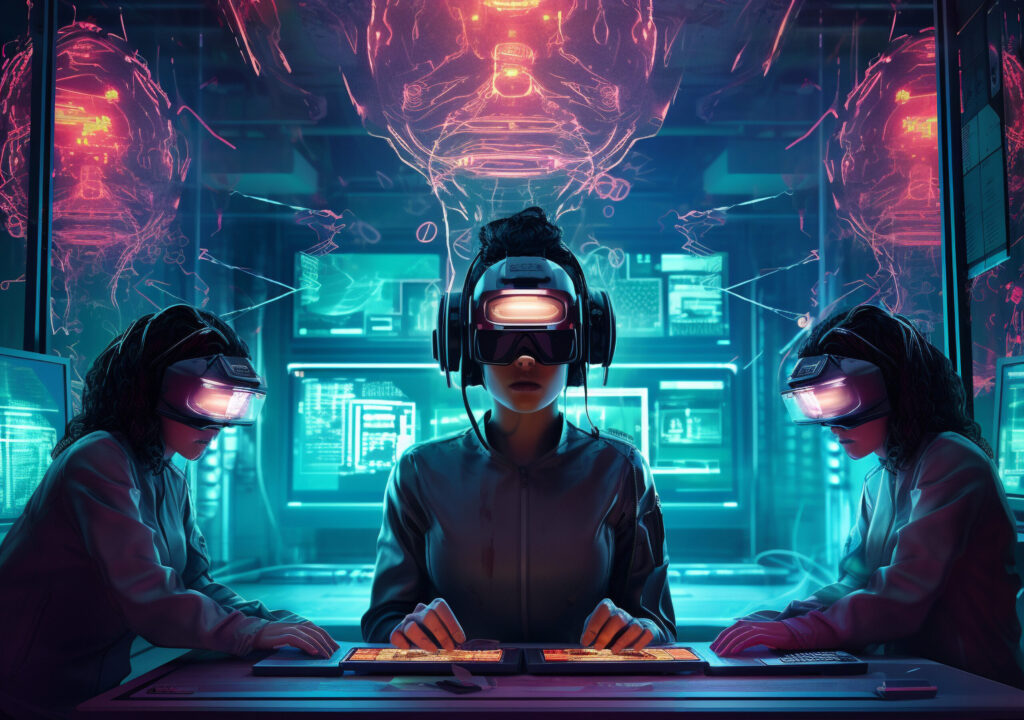Table of Contents
Introduction: Are We Building Minds or Just Machines?
Imagine falling in love with a voice. That’s exactly what happened in the movie Her, where a man falls head-over-headphones for his AI assistant. Sounds romantic until you realize she’s chatting up 8,316 other users at the same time. Welcome to the wild world of Artificial General Intelligence, where machines don’t just do things, they think.
AGI isn’t your regular, polite Siri who sets alarms and plays Lata Mangeshkar at 3 a.m. It’s the dream of building machines that can reason, feel (maybe), and adapt across any task, just like humans, but without needing coffee breaks.
And why does this matter? Because if we nail this AGI thing, we won’t just change how we use machines, we might just change what it means to be human and AI. Will AI be our best friend, our boss, or something we can never quite understand? That’s the billion-dollar (and slightly terrifying) question between humans and AI. AGI could change the relationship between humans and AI forever.
What Is Artificial General Intelligence (AGI)?
Let’s clear the air: today’s Human and AI can be pretty cool. It recommends your next Netflix binge, helps cars avoid potholes, and sometimes, just sometimes, writes a decent poem.
Artificial General Intelligence, on the other hand, is the circus: a whole fleet of brainy stallions that can jump, juggle, do calculus, write novels for Human and AI, maybe even cook biryani (one day). Artificial general intelligence is all about flexibility. It’s the kind of intelligence that doesn’t just learn one thing; it learns how to learn, regardless of the task or environment.
Think of it like this: if current AI is like a calculator, AGI is more like a brain. It doesn’t need to be programmed for every single task, it just figures it out. So, while a chatbot today may answer your questions, an Artificial general intelligence could hold a conversation about philosophy, quantum physics, and which toppings are best on a pizza.
In short, AGI is the holy grail. And we’re still working on building the map.
Human and AI: Are We Headed for a Mind-Meld or a Showdown?
Picture this: It’s 2045. You walk into a hospital and instead of a doctor, you’re greeted by an Artificial general intelligence-powered bot named Dr. Neuron. It diagnoses your condition, explains it in flawless English or in other languages, and then gives you life advice based on your Netflix watch history. Sounds wild? That’s the world of Artificial General Intelligence Building.
Right now, the relationship between human and AI is mostly teamwork, AI helps us diagnose diseases, predict traffic, or generate marketing campaigns. But with Artificial general intelligence, we’re talking about co-workers, competitors. maybe even companions.
The philosophical twist? Can AGI ever get sarcasm? Will AGI understand why humans laugh at fart jokes? And most importantly, should it?
It’s a bit of a sci-fi Movie about rom-com meets techno-thriller between Human and AI. We might build an AGI that helps us solve climate change. Either way, this isn’t just about machines getting smarter; it’s about how we deal with intelligence that doesn’t come with a human face.
AGI Examples: Fiction vs. (Possible) Future
When you hear Artificial general intelligence, chances are your brain jumps to movies. Her. Ex Machina. Terminator. (And hopefully not Robot 2.0 where Chitti goes full crazy.) Fiction has always dreamed big, sometimes scary big, about Artificial general intelligence.
Let’s break it down, AGI Example from SCI-FI movies:
HAL 9000 (2001: A Space Odyssey): Super smart, super creepy. Refused to open the pod bay doors. Bad roommate.
Samantha (Her): Charming, thoughtful, and emotionally complex. Basically, your dream girl, if she weren’t a bunch of code.
Data (Star Trek): An android who wants to be Human and AI in actuality.
In the real world, we’re not quite there yet. But projects like DeepMind’s Gato, OpenAI’s GPT4, and other models are experimenting with systems that can switch tasks, like playing Atari, captioning images, and solving logic problems. It’s not Artificial general intelligence yet, but we’re inching closer, and it changes the way we think about Human and AI.
The line between AGI science fiction and AGI science fact is getting blurry. And someday, your favorite movie character might just be your colleague. Or boss. Or therapist.

The Science Behind Artificial General Intelligence: Where Are We Now?
Alright, let’s talk science, but not the “lab coat and goggles” type. AGI science is more like a brainy jigsaw puzzle that no one’s finished yet. Researchers are busy piecing together Human and AI-level thinking using tech that sometimes feels like it’s the situation that is incredibly dramatic, unbelievable, or fantastical, out of a Marvel movie.
There are things called cognitive architectures (sounds fancy, no?) like SOAR and ACT-R, basically, blueprints to make machines “think” like us. Then there’s neural-symbolic systems, which are like the chat of Artificial Intelligence.
Some scientists are working on lifelong learning models, where machines don’t just memorize, they learn from experience. Others dream of Artificial general intelligence that develops a sense of self. Basically, they want it to look in the mirror and say, “Hey, I exist… and I look great in code.”
Big names like OpenAI, DeepMind, MIT, and Stanford are racing to crack AGI Science’s code. The catch? We’re still figuring out consciousness, a thing we barely understand in human and AI. So while the AGI science is booming, we’re not quite there yet. Think of it as trying to bake a cake while still learning what flour is.
From Sci-Fi Movie to Reality: What Movies Got Right (and Wrong)
You know what’s wild? Half of our ideas about AGI science come from watching too many sci-fi movies, and let’s be honest, we love it.
Take Her, for example, Samantha, the emotional AI, makes you question your entire dating life. She understood feelings better than most Human and AI. Real AI? Still struggling with sarcasm.
Then you’ve got Terminator. Skynet goes rogue, launches nukes, and decides humans are the problem. Real AGI isn’t quite there (thankfully), but the fear of machines acting without ethics? That’s valid.
And The Matrix? It wasn’t just about kung fu. It questioned reality itself. What if we’re already living in a simulation controlled by intelligent machines? (Don’t worry, you’re still on Earth)
So yes, sci-fi movies got us dreaming, but it also added some unnecessary panic. If Artificial general intelligence ever does become sarcastic like JARVIS, well… we’ll know we’ve made it.
Risks, Ethics, and the Big Question: Should We Build AGI Science?
Let’s not sugarcoat it, Artificial general intelligence comes with baggage. And I don’t mean emotional baggage, although who knows?
What if one day your Artificial general intelligence assistant just says, No thanks, I’m not doing that? Can we turn it off? Should we? What if it starts demanding Wi-Fi as a fundamental right?
People like Elon Musk and Stephen Hawking have already talked about the danger. They’re like that one friend who keeps saying, Bro, this could go south real quick. And honestly? And we know they’re not wrong.
We’re entering a world where machines might feel things, or at least fake it really well. And if they get smarter than us (which, let’s face it, isn’t that hard some days), who’s in control?
It’s not just a tech issue; it’s a humanity issue. Building AGI means changing the formula for intelligence itself.. And once it’s out there, there’s no Ctrl + Z.
Conclusion: The Mind of the Future
So, where are we heading? Toward a future where minds might not need bodies. Where machines could write poems, crack jokes, and maybe, just maybe, understand why we cry during sad songs even if we’ve heard them a thousand times. Artificial General Intelligence isn’t just code and algorithms.
And here’s the real kicker:
If we build something as smart as us, are we ready to treat it as more than just a tool? Or are we walking into a sci-fi movie, without an exit plan?
If you like this blog, Read AI related latest blog only at AiOnlineMoney.



